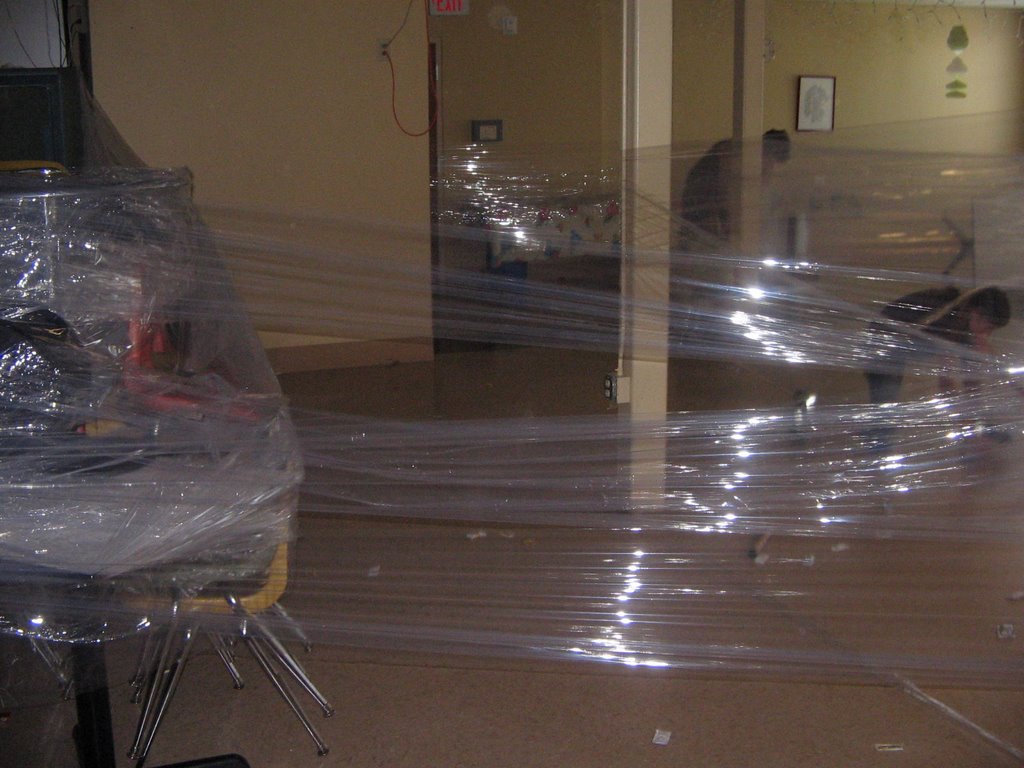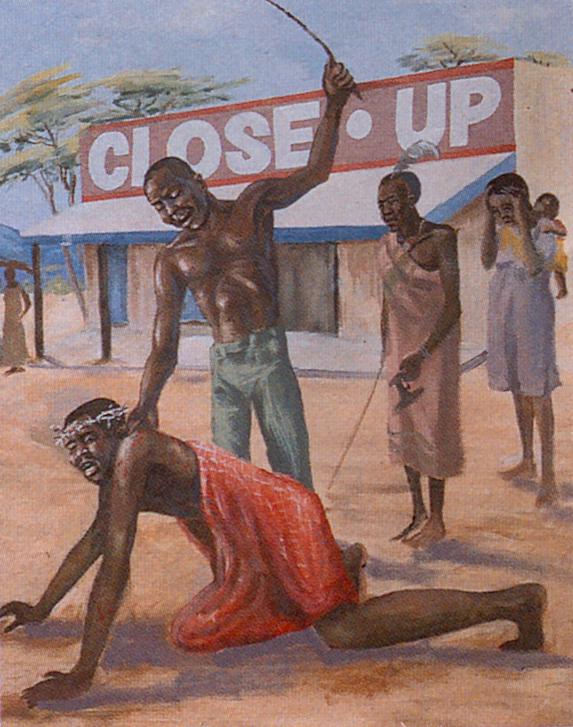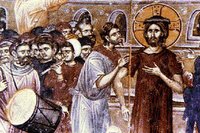 HERE'S HOW THE DIALOG WENT IN RESPONSE TO MY POST:J. L&H
HERE'S HOW THE DIALOG WENT IN RESPONSE TO MY POST:J. L&H:
John, you're right that we spend too much time fighting over homosexuality. The Left could do the church a huge favor by dropping the subject so that we can move forward with the work of the Kingdom of God. J. W. :
I agree. If the Left would only drop it, we could get on with other things. But we on the right cannot control the left. We can only control ourselves. And until we conservatives clean up our own house, we're powerless.This is a given: The issue of homosexuality is complex. Of course it's not complex for some- the discipline forbids "practicing" homosexuals to be ordained and does not perfrom same sex marriage or unions- PERIOD. That's pretty easy.
But
THERE ARE OTHER ISSUES GOING ON HERE. I have never found myself fitting nice and neatly in a doctrinal, theological or political camp so I always try to see all sides but I confess that I'm not objective. In fact I doubt if anyone is actually objective. You've grown up with learned behaviors, tendencies, and life experiences that have shaped your outlook on life, just as I have. So any sense of true objectivity really goes out the door. So although I have strong ideas, I value others; even when I think they fly south of the gospel of Jesus Christ.
But I do see some heavy issues going on here that makes this a complex issue.
ISSUE 1: The conversation between J. and J. really characterizes our desire to "control" and have "power". In this case, neither J. nor J., as "self proclaimed" conservative Christians are desiring power, but are participants in a particular group (who happen to be conservative, and heterosexual) who have enjoyed a strong and long reign within the American church.
I would argue that within our Methodist denomination much of our national leadership has been quite liberal (secular may be a better word here) in it's language and overall direction. I say this because in a lot of ways it seems that we as a Methodist church have taken our ques from what secular society has been promoting. Well over the last few years our secular society has swung right. So who's voice do we hear more from now in our denomination? With authority- definitely the right.
So my liberal brothers and sisters (who I tend to sympathize with in some areas) have felt the loss of conrol and loss of their role within the church- wanting to be everything to everybody (that's my opinion).
But my brothers and sisters on the right (who I can often find some common ground) are scared of losing power, of losing cotrol of their role in the church- gatekeeprs of doctrine.
But both have done harm. One has helped shape a denomination that has lost its identity and have no "practices" to sustain it. The other has created a language of exclusion and fear and hid it within words such as: Orthodox, Doctrinally Pure, Holiness, Scritptural Authority. All of these are wonderful words but have been marginalized by the religious right in much the same way that the left has used secular vocabulary to promote an AGENDA.
ISSUE 2: "Practicing" as a way of distinguishing a "moral" homosexual from an "immoral" homosexual is going to run its season at some point. I think it's a weak argument, myself. I
could argue that a person who is a member of a congregation but only attends once on Christmas and once on Easter is not a "practicing" Christian.
But then I could also argue that in the more "orthodox" thought of John Wesley- a congregation who does not partake of the sacrament of eucharist, as often as can be done, and other means of grace such as fasting are running the risk of falling from grace.
All this to say that of the friends and people that I know or have known who are gay- I would have a hard time using language such as "practicing" in speaking of them. It is an embodiment- a part of who they are. There is more to who they are than who they do or don't have intercorse with. So when our language excludes by placing them into camps- practicing and nonpracticing we are basically putting "
yellow stars" on a group.
ISSUE 3: For the most part the argument from the left has come from very politically charged groups such as reconciling ministries network or other very political groups. The language they use, the political rhetoric and agenda is definitely borrowed from secularism. Why is this bad? Well it robs the church from making this an ecclesial issue. We now have no language out of which to talk to one another.
We now have those who live with a need to control and use the language of fear pitted against those who have no ecclesial langugae but take their ques from the politics of the world.
SOLUTIONS: I have none, but I do have thoughts and ideas for steps in a different direction. We need an ecclesial language out of which to struggle together where POWER AND CONTROL is not at the center but Eucharist- all are welcomed to the table as brother and sister who desire a reconciling relationship with God.
If one looks in the book of Acts and the marginalization of the gentiles in the newly established Jewish/Christian movement then one will find a narrative of struggle- one group feeling marginalized and one group trying to maintain doctrine and control. I think the biblical narratives are a wonderful springboard for discussion and IDEAS. Getting away from the tired arguments using scripture to back your agenda is a MUST- it's a postmodern stalemate. Instead maybe we need to focus on the narratives of scripture, our catholic tradition, and the liturgies that have sustained us for the last 2000 years and then allow the Spirit to guide our church in a new direction and imagine a little more and see what fresh possibilities are there.
 We arrived into the town square and the town was hopping. There were people everywhere. I thought it was pretty cool because the downtown was completely blocked off for the festival and all ages were volunteering and greeting us. When we got out of our car we walked over to a "pick up" station to get a hayride up to the festival area. In the picture Jen and Jonas are waiting patiently.
We arrived into the town square and the town was hopping. There were people everywhere. I thought it was pretty cool because the downtown was completely blocked off for the festival and all ages were volunteering and greeting us. When we got out of our car we walked over to a "pick up" station to get a hayride up to the festival area. In the picture Jen and Jonas are waiting patiently. Abby was ready for a day of "daddy hiking" at the festival.
Abby was ready for a day of "daddy hiking" at the festival.




 ley"- folks had cooked up the most amazingly diverse concoctions of cornbread you'll ever see. I tried: chicken and dressing cornbread, apple cinnemon cornbread, brocolli cornbread, mountain cornbread, and more that I cannot remember. But it was cool to note that the UMC WAS REPRESENTIN'!!! Randolph UMC was in the house cookin' up some good stuff!!
ley"- folks had cooked up the most amazingly diverse concoctions of cornbread you'll ever see. I tried: chicken and dressing cornbread, apple cinnemon cornbread, brocolli cornbread, mountain cornbread, and more that I cannot remember. But it was cool to note that the UMC WAS REPRESENTIN'!!! Randolph UMC was in the house cookin' up some good stuff!!



























